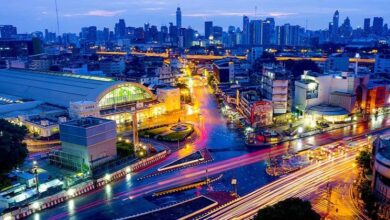Hawaii, known for its stunning landscapes, lush greenery, and pristine beaches, is facing growing challenges when it comes to sustainable transportation. As the state grapples with issues such as traffic congestion, environmental concerns, and the need to reduce its carbon footprint, innovative solutions have become imperative. One such solution is briansclub a forward-thinking initiative aiming to revolutionize sustainable transportation in Hawaii. In this article, we will explore the concept of sustainable transportation, delve into the unique features of Briansclub, and discuss its potential impact on Hawaii’s transportation landscape.
**The Need for Sustainable Transportation**
- *Challenges in Hawaii’s Current Transportation System*
Hawaii’s unique geography, with its islands separated by vast stretches of ocean, presents a challenge for transportation infrastructure. The state heavily relies on cars, which contribute to traffic congestion and air pollution. The narrow and winding roads on some islands exacerbate these issues. The need for sustainable transportation solutions in Hawaii is apparent.
- *Environmental Concerns*
Hawaii’s fragile ecosystems are under threat due to carbon emissions from conventional vehicles. As the state is committed to preserving its natural beauty and biodiversity, transitioning to sustainable transportation is crucial for its environmental sustainability goals.
**Introducing Briansclub**
- *What Is Briansclub?*
Briansclub is a pioneering initiative aimed at addressing Hawaii’s transportation challenges sustainably. It is a comprehensive, community-oriented platform that offers a range of eco-friendly transportation options designed to reduce traffic congestion, lower emissions, and improve mobility for residents and tourists alike.
- *Modes of Transportation*
– **Electric Bicycles and Scooters**: Briansclub provides electric bicycles and scooters for short-distance commuting and sightseeing. These vehicles are efficient, emission-free, and perfect for exploring the islands’ scenic beauty.
– **Electric Car Rentals**: Visitors and residents can rent electric cars from Briansclub’s fleet. These vehicles are equipped with cutting-edge technology, ensuring a comfortable and eco-friendly driving experience.
– **Ride-Sharing Services**: Briansclub offers ride-sharing services to reduce the number of private cars on the road. This not only decreases traffic congestion but also encourages carpooling, further lowering emissions.
- *Innovative Infrastructure*
– **Charging Stations**: To support its electric vehicle fleet, Briansclub has installed a network of conveniently located charging stations across the islands. This infrastructure ensures that electric vehicles are readily accessible and can be charged with ease.
– **Smart Mobility App**: Briansclub’s user-friendly mobile app enables users to locate available vehicles, plan routes, and access real-time information about their transportation options. This app promotes efficient, sustainable travel.
**Benefits of Briansclub**
- *Reducing Traffic Congestion*
By offering a variety of sustainable transportation options, Briansclub helps reduce the number of private vehicles on the road, thus easing traffic congestion, especially in densely populated areas and popular tourist destinations.
- *Environmental Benefits*
Briansclub’s commitment to electric vehicles and ride-sharing significantly reduces greenhouse gas emissions, contributing to Hawaii’s efforts to combat climate change and protect its natural beauty.
- *Promoting Tourism*
Sustainable transportation options enhance the visitor experience in Hawaii. Tourists can explore the islands in an eco-friendly way, minimizing their impact on the environment.
- *Community Engagement*
Briansclub actively engages with local communities, working to improve transportation options for residents. By offering accessible and affordable transportation, it supports the economic well-being of the communities it serves.
**Overcoming Challenges**
- *Infrastructure Expansion*
To maximize its impact, Briansclub must continue expanding its infrastructure, including charging stations and vehicle availability, across all the Hawaiian islands.
- *Public Awareness*
Educating the public about the benefits of sustainable transportation and the availability of Briansclub services is vital. This requires effective marketing and outreach efforts.
- *Regulatory Framework*
Briansclub must work closely with local authorities to navigate regulatory challenges and ensure compliance with transportation laws in Hawaii.
**The Future of Sustainable Transportation in Hawaii**
Briansclub represents a promising step towards a more sustainable transportation future for Hawaii. As it continues to grow and adapt, it has the potential to reshape the way people move around the islands and reduce Hawaii’s environmental footprint.
- *Scaling Up*
As Briansclub gains popularity and expands its services, it has the potential to become a pivotal player in Hawaii’s transportation landscape. Its success may inspire similar initiatives in other regions facing similar challenges.
- *Integration with Public Transportation*
Collaborating with existing public transportation systems can further enhance Briansclub’s reach and effectiveness, providing residents and visitors with seamless, sustainable mobility options.
- *Innovation and Technology*
Staying at the forefront of technology and adopting emerging trends, such as autonomous vehicles and advanced energy solutions, can make Briansclub even more efficient and eco-friendly.
**Conclusion**
In a state as environmentally sensitive and geographically unique as Hawaii, sustainable transportation solutions like Briansclub are not just welcome but necessary. By offering eco-friendly transportation options, reducing traffic congestion, and promoting community engagement, Briansclub is helping to pave the way for a greener and more sustainable future for Hawaii’s transportation system. With continued growth and support, Brainsclub could become a model for sustainable transportation initiatives in similar regions around the world, proving that responsible transportation is not only possible but essential for the preservation of our planet and the well-being of our communities.





